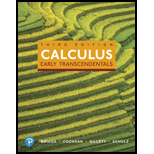
Explain why or why not Determine whether the following statements are true and give an explanation or counterexample.
a. The rotational field F = 〈–y, x〉 has zero curl and zero divergence.
b. ▿ × ▿ϕ = 0
c. Two
d. Two vector fields with the same divergence differ by a constant vector field.
e. If F = 〈x, y, z) and S encloses a region D, then
a.
To explain: Whether the given statement is true or not.
Answer to Problem 1RE
The statement is false.
Explanation of Solution
Given statement:
The rotational field
Calculation:
The given rotational field
Assume
The curl is
Substitute
Thus, the curl is 2.
Hence, the statement is false.
b.
To explain: Whether the given statement is true or not.
Answer to Problem 1RE
The statement is true.
Explanation of Solution
Given statement:
The following
Calculation:
The given statement is
Here,
Hence,
It is known that the curl of a conservative field is zero.
Hence,
Therefore, the statement is true.
c.
To explain: Whether the given statement is true or not.
Answer to Problem 1RE
The statement is false.
Explanation of Solution
Given statement:
Two vector fields with the same curl differ by a constant vector field.
Calculation:
Consider the rotational field
Assume
The curl is
Substitute the values
Thus, the curl is 2.
Consider the vector field
Assume
The curl is
Substitute the values
Thus, the curl is 2.
Hence, the vector fields
Thus, the statement is false.
d.
To explain: Whether the given statement is true or not.
Answer to Problem 1RE
The statement is false.
Explanation of Solution
Given statement:
Two vector fields with the same divergence differ by a constant vector field.
Calculation:
Consider the rotational field
Obtain the divergence.
Thus, the divergence is 1.
Consider the rotational field
Obtain the divergence.
Thus, the divergence is 1.
Hence, the vector fields
Thus, the statement is false.
e.
To explain: Whether the given statement is true or not.
Answer to Problem 1RE
The statement is true.
Explanation of Solution
Given statement:
If
Theorem Used:
Divergence theorem:
Let F be a vector field whose components have continuous first partial derivatives in a connected and simply connected region D in
Calculation:
Consider the rotational field
Compute the divergence of F.
Use the Divergence theorem stated above that obtains the value of
Thus, the statement is true.
Want to see more full solutions like this?
Chapter 17 Solutions
Calculus: Early Transcendentals (3rd Edition)
Additional Math Textbook Solutions
A Problem Solving Approach To Mathematics For Elementary School Teachers (13th Edition)
Elementary Statistics (13th Edition)
Calculus: Early Transcendentals (2nd Edition)
Elementary Statistics
University Calculus: Early Transcendentals (4th Edition)
Calculus for Business, Economics, Life Sciences, and Social Sciences (14th Edition)
- I need help in ensuring that I explain it propleryy in the simplifest way as possiblearrow_forwardI need help making sure that I explain this part accutartly.arrow_forwardPlease help me with this question as I want to know how can I perform the partial fraction decompostion on this alebgric equation to find the time-domain of y(t)arrow_forward
- Please help me with this question as I want to know how can I perform the partial fraction on this alebgric equation to find the time-domain of y(t)arrow_forwardEvaluate F³ - dr where ♬ = (4z, -4y, x), and C' is given by (t) = (sin(t), t, cos(t)), 0≤t≤ñ .arrow_forwardMid-Term Review Find the formula for (f + g)(x). f(x) = x² - 10x + 25 and g(x) = x² - 10x + 24 (f + g) (x) = [ 2 ]x² X + DELL Skip Sarrow_forward
- Calculus III May I please have some elaborations on Example 2 part a? Thank you.arrow_forward1. A bicyclist is riding their bike along the Chicago Lakefront Trail. The velocity (in feet per second) of the bicyclist is recorded below. Use (a) Simpson's Rule, and (b) the Trapezoidal Rule to estimate the total distance the bicyclist traveled during the 8-second period. t 0 2 4 6 8 V 10 15 12 10 16 2. Find the midpoint rule approximation for (a) n = 4 +5 x²dx using n subintervals. 1° 2 (b) n = 8 36 32 28 36 32 28 24 24 20 20 16 16 12 8- 4 1 2 3 4 5 6 12 8 4 1 2 3 4 5 6arrow_forward= 5 37 A 4 8 0.5 06 9arrow_forward
- Algebra & Trigonometry with Analytic GeometryAlgebraISBN:9781133382119Author:SwokowskiPublisher:Cengage
 Elementary Linear Algebra (MindTap Course List)AlgebraISBN:9781305658004Author:Ron LarsonPublisher:Cengage Learning
Elementary Linear Algebra (MindTap Course List)AlgebraISBN:9781305658004Author:Ron LarsonPublisher:Cengage Learning Algebra and Trigonometry (MindTap Course List)AlgebraISBN:9781305071742Author:James Stewart, Lothar Redlin, Saleem WatsonPublisher:Cengage Learning
Algebra and Trigonometry (MindTap Course List)AlgebraISBN:9781305071742Author:James Stewart, Lothar Redlin, Saleem WatsonPublisher:Cengage Learning  Linear Algebra: A Modern IntroductionAlgebraISBN:9781285463247Author:David PoolePublisher:Cengage Learning
Linear Algebra: A Modern IntroductionAlgebraISBN:9781285463247Author:David PoolePublisher:Cengage Learning



